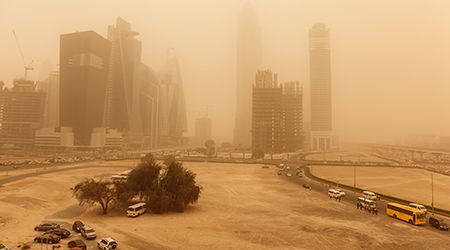Dust storms are natural events in arid and semi-arid regions of the world which can adversely affect humans and the environment. According to UNEP, in the Middle East and North Africa dust storms cause a whopping $13 billion loss in GDP annually! Here is what you should understand about the dust storms that hit UAE throughout the year and what to do to protect yourself in a storm. Remember, dust can have a negative impact on your health, so it’s advisable to clean your home thoroughly after a dust storm. If your home was hit particularly hard, then it would be a good idea to hire a Dubai cleaning company to do a deep clean of your home to get rid of any dust or sand properly.
Where does all that dust come from
Sand and dust storms are caused by unstable lower atmospheric conditions. This leads to strong winds blowing over loose sand and picking up huge quantities of it. Most storms are several thousand feet thick, reduce visibility and air quality and can transport particles for a great number of miles. The dust that blows over UAE comes from the Empty Quarter, Iran and North Africa.
While a natural phenomena, dust storms are increasing in frequency and severity due to human mismanagement of natural resources. Unchecked groundwater withdrawals, unsustainable mining and oil extraction, dam construction and excessive deforestation is causing desertification. This leads to more loose soil being available for the wind to pick up.
What has Climate Change got to do with it
UAE’s climatic conditions are defined by high temperatures and evaporation and low average rainfall. This provides excellent conditions for soil erosion. Since global temperatures are rising due to climate change, UAE is expected to have hotter summers in the future. The higher temperatures will lead to drier conditions which will result in more frequent dust storms.
The UAE government is trying to come up with solutions to address the severe changes in climate that can already be observed and figure out mitigation and adaptation strategies for the future. The real time dust forecasting system that was launched at the Masdar Institute of Science and Technology in Abu Dhabi helps the UAE government and residents be prepared for dust storms before they strike.
How do dust storms affect your health
To be prepared for the expected increase in dust storms in the UAE, you should know how a dust storm can affect your health. Dust is usually categorized as large, coarse or fine. Large dust particles can only cause skin or eye irritation. Coarse particles, which are usually the most common in dust storms, can reach the inside of your nose, mouth or throat. These do not pose a serious health hazard except for people with pre-existing breathing-related problems such as asthma, bronchitis or emphysema. One reason for the high incidence of asthma in the UAE is because it lies in a dust storm prone region. There is a also good chance that dust storms will pick up and transport biological materials such as bacteria and viruses across regions. These are a health hazard, especially for the children and elderly. Here are some steps you can take to reduce your risk of exposure to the dust:
- Properly seal your home before a dust storm strikes. Get a handyman to close up any cracks that the dust can creep through.
- Stay indoors with the air conditioning unit on.
- Spend as little time outside as possible during a storm.
- If you need to venture outside, keep your nose and mouth covered with a pollution mask or a damp cloth.
- Avoid strenuous exercise, especially if you have a breathing-related condition.
- If you accidentally leave a window or door open during a dust storm, put on a pollution mask and clean your home thoroughly.
If you develop symptoms such as shortness of breath, persistent eye irritation, coughing, wheezing or chest pain, immediately seek medical advice.
While dust storms can cause further desertification and lead to air pollution, they also have their benefits. Dust storms carry nutrients around the world, distributing them over land and in oceans. For example, dust storms that blow from Sahara help fertilize the Amazon forest and also provide nutrients to the aquatic life in the Atlantic Ocean. Yet the dust has no benefit for you if it sneaks into your home, so be sure to book a cleaning service on ServiceMarket to get rid of it for you.







